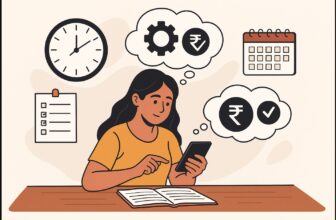In India, confidence isn’t just about being outspoken or assertive. For many people, low self-esteem begins early, often shaped by their place of birth, medium of education, accent, skin tone, caste, or class. It’s not just internal doubt; it’s years of external judgment.
If you’ve ever felt hesitant to speak English in front of others, if you’ve stayed silent in group discussions even when you had ideas, or if you’ve laughed off compliments because you felt undeserving, this listicle is for you.
Why Low Self-Esteem Is So Widespread in India
Confidence issues in India aren’t just personal, they’re cultural and systemic. Here are the deeper patterns that often go unnoticed:
Language and Accent Bias
In urban areas, people often judge intelligence based on how fluent or polished your English sounds. If your grammar isn’t perfect or you speak with a regional accent, you’re often treated as less competent, even when you’re not.
Social Conditioning
From a young age, many are taught to stay quiet in front of elders, suppress opinions, and follow without questioning. This makes self-expression feel risky instead of natural.
Comparison Culture
Whether it’s your marks, salary, job title, or marital status, everything becomes a contest. Even success is measured by how you compare to others, not how far you’ve come.
Caste/Class Divide
Though not always openly discussed, caste and class still influence how people are treated and how they treat themselves. Internalized inferiority is common, especially in mixed environments like colleges or corporate offices.
Lack of Emotional Education
Our education system teaches how to score high, not how to deal with failure, rejection, or shame. As a result, many grow up with zero emotional tools to handle setbacks confidently.
11 Signs You May Be Struggling With Self-Esteem
These signs often show up in everyday situations, at work, at home, and even on WhatsApp groups.
1. You Downplay Your Achievements Automatically
Say you get a promotion or win a small award. Your first instinct is to say, “It’s nothing” or “I just got lucky.” Many Indians are raised to believe humility is better than pride, but this often turns into self-erasure.
- You never let yourself feel proud because you fear being seen as arrogant.
2. You Avoid Speaking in English or in Public
In cities like Bangalore, Mumbai, or Delhi, you may hesitate to speak English out of fear your grammar or pronunciation will be judged. This fear can be so deep that you stay quiet even when you know the answer.
- You let others lead meetings, presentations, or even small group chats, even when you have more to say.
3. You Constantly Need External Validation
Whether it’s a “good job” from your boss or a like on Instagram, your mood is tied to others’ opinions. If you don’t get approval, you assume you’re doing something wrong.
- You check your phone often after posting something, just to see how many people noticed.
4. You Apologize for Having Opinions
You say “sorry” for asking a question, expressing a need, or even just existing loudly. This isn’t about manners, it’s about feeling like a burden.
- You say “sorry” in emails or messages even when it’s not your fault.
5. You Struggle to Say “No”
You attend events you don’t want to. You take on work that overloads you. You say yes because you don’t feel confident enough to set boundaries.
- You worry that saying “no” will make people dislike or abandon you.
6. You Avoid Eye Contact in Conversations
You don’t look people in the eye, especially authority figures or English speakers. You feel small, even when you’re not doing anything wrong.
- You look down while talking to teachers, managers, or confident peers.
7. You Fear Trying Anything New
You want to join a gym, take a course, start a YouTube channel, but you hold yourself back, thinking, “Who will listen to me?”
- You spend more time doubting yourself than exploring your curiosity.
8. You Constantly Compare Yourself
You compare your job, salary, relationship status, or English skills with others, and usually feel behind.
- Every time a cousin or friend achieves something, you silently feel “less.”
9. Compliments Make You Uncomfortable
When someone praises you, you either deflect it or respond with suspicion. You assume they’re just being polite.
- You feel nervous or unworthy when someone appreciates your work or personality.
10. You Believe Others Are Naturally Better
You assume confident speakers, stylish people, or well-educated peers are “built different.” You don’t see yourself as capable of becoming like them.
- You admire others but don’t believe you could ever do what they do.
11. You Over-Explain Simple Choices
Whether it’s ordering vegetarian food, choosing a local college, or dressing simply, you feel the need to justify it.
- You feel defensive even when no one is judging you.
13 Practical Ways to Start Rebuilding Confidence in the Indian Context
This isn’t about affirmations or “thinking positive.” These actions are slow, silent, and sustainable. Most importantly, they don’t rely on pretending to be someone else.
1. Speak Your Language Without Apology
Many Indians feel inferior because they aren’t fluent in English. But confidence begins when you stop apologizing for your identity. Express clearly in Hindi, Tamil, Bengali, or any language you feel at home in. English is a skill, not a sign of intelligence.
Try this: In bilingual spaces (like college or WhatsApp groups), contribute in your comfort language if allowed. Build your presence first, then work on fluency without shame.
2. Keep a Daily ‘Done’ Journal
Instead of writing what you should do, list what you did do today. This helps you see that you’re already moving forward, even if it’s slow.
Example:
- Helped my sister with her homework
- Asked a question in the group call
- Ate lunch on time without skipping
These small wins matter.
3. Explore Familiar Places Alone
You don’t have to take a solo trip to feel brave. Go to a local bookstore, cafe, or museum by yourself. It rewires your brain to trust your own presence in public.
Why it works: You become less dependent on social company to feel valid in public spaces.
4. Change One Body Language Habit
Confidence is also physical. Start with something small, like keeping your shoulders back while walking or uncrossing your arms during conversation.
Change you’ll notice: You’ll feel more grounded, and people may start responding to you with more respect.
5. Practice Rejection on Purpose
Ask for small things you expect to be denied, like an extra spoon at a roadside stall or a seat change in a train. Learning to handle “no” builds resilience.
Result: You begin to realize that rejection won’t destroy you, and that some people will say “yes.”
6. Teach Someone a Simple Skill
Whether it’s teaching your father how to send a WhatsApp photo or helping a neighbour fill out an online form, this builds your sense of value.
Why this works in India: Knowledge is often gatekept. Teaching makes you feel capable without needing certificates.
7. Curate Your Online Feed
Unfollow influencers who make you feel like your life isn’t good enough. Follow people who share progress, not perfection.
What to change: Replace luxury lifestyle reels with creators who share their struggles, learning curves, or everyday life.
8. Record Voice Notes for Yourself
Every night, talk to yourself for two minutes. Record what you felt, learned, or observed. This builds familiarity with your own voice and ideas.
Real benefit: You stop cringing at your accent, tone, or pauses, and start accepting your real self.
9. Choose Spaces That Let You Finish Your Sentences
Find people (even one or two) who don’t interrupt or judge your phrasing. Speaking fully helps you reshape how you see your ideas.
Start with: Study groups, cousins, colleagues, or even an online writing community where your thoughts are respected.
10. Read One Paragraph Aloud Daily
Not to sound fluent, but to feel fluent. You’ll improve pacing, clarity, and tone by simply hearing yourself every day.
Book suggestion: Pick a Hindi-English bilingual book or newspaper. Stick to it even if you stumble.
11. Use Pauses, Not Speed, When Speaking
In India, speaking fast is often mistaken for confidence. But intentional pauses show clarity and calmness.
Practice in daily life: When someone asks a question, wait one second before replying. You’ll come across as more composed.
12. Share Ideas Anonymously
Use anonymous platforms like Reddit or Quora to share your thoughts. You’ll learn that your ideas have value, even when your name isn’t attached.
Why this helps: You break the fear of public judgment while staying safe.
13. Tell Your Story Without Editing Out Your Past
If you’re from a small village, went to a government school, or switched careers late, own it. That’s not shameful; it’s experience.
Try this: Write or speak your story the way you’d tell a friend who respects you, not someone you need to impress.
Rebuild Confidence Without Changing Who You Are
No one becomes confident in a week. It’s not a viral reel or a loud personality trait. It’s a quiet, daily return to yourself, built through action, not appearance.
You don’t need perfect English. You don’t need an MBA. You don’t need to act “smart.”
What you do need is consistent self-respect, practiced every day in the way you talk, walk, and respond to the world.





